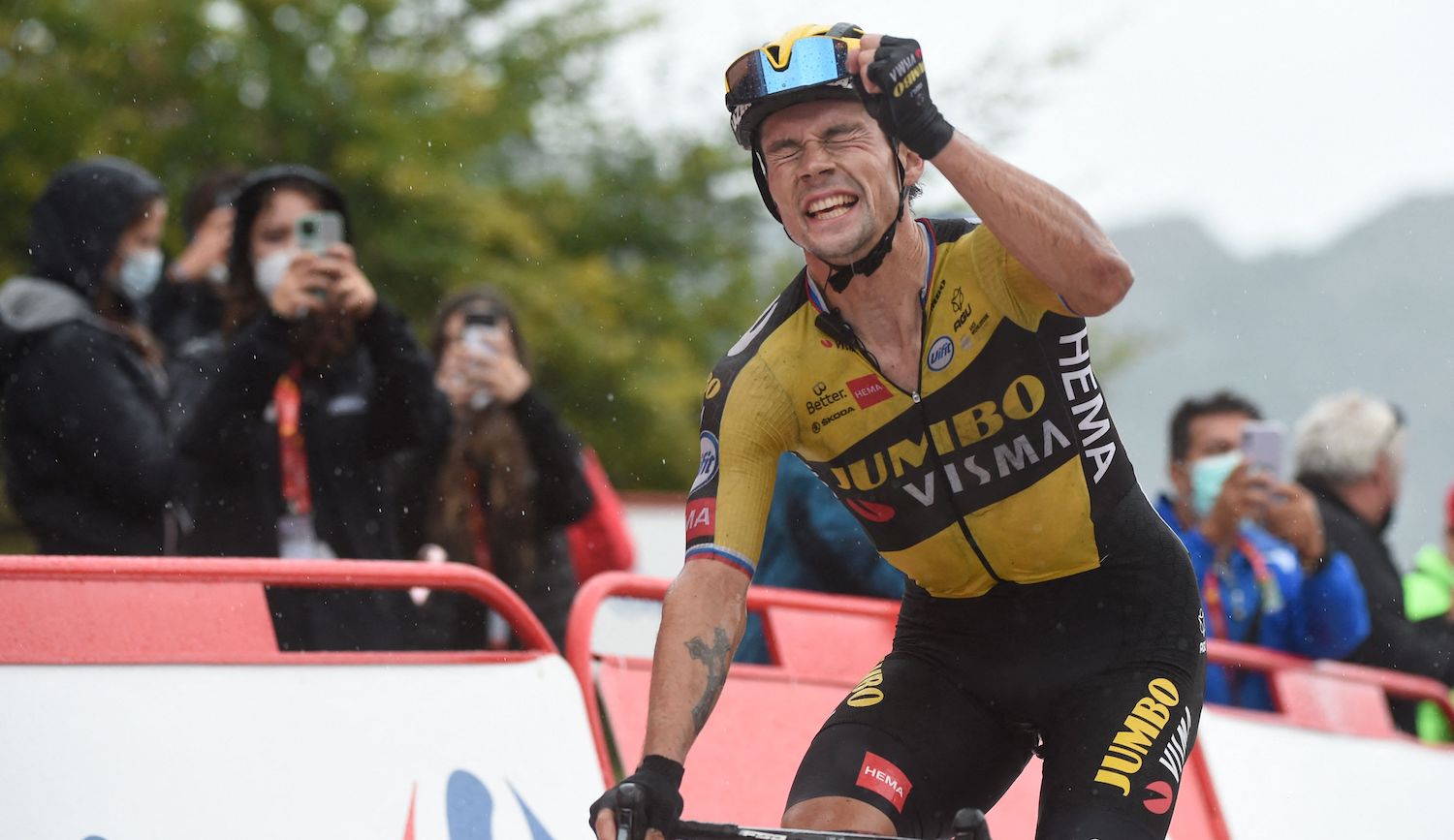The two riders' postures told the story.
With four kilometers remaining in Wednesday's pivotal Stage 17 of the Vuelta a España, Egan Bernal poked his head up from the weary coiled position he'd contorted himself into, looked across the valley over to the next switchback, saw an upright Primoz Roglic powering on ahead, and hung his head even lower over his front bars. Bernal, the 2019 Tour de France champion, and Roglic, the two-time defending Vuelta champion, had escaped together on the day's penultimate climb, but once the race hit the slopes of the Lagos de Covadonga climb, Bernal melted away in the rain while Roglic sealed an authoritative winning margin of 1:35. The usually inexpressive Slovenian's rhythmic cadence didn't break until he let out a shriek as he cemented the foundation of what could be a third straight Vuelta win.
🏁Etapa 17 | Stage 17
— La Vuelta (@lavuelta) September 1, 2021
🙋🏻♂️🏆 @rogla 🇸🇮🏆#LaVuelta21 pic.twitter.com/Q6nOzTKsws
Roglic is now 2:22 ahead of Enric Mas and 3:11 up on Mas's Movistar teammate Miguel Ángel López. That margin is the largest any of the race's four overall leaders have had at any point in the race. Even though Roglic has dominated this race for three years running, it's surprising that he wound up being the first rider to take control of the race. The Vuelta is now his to lose, and he's established himself as the best rider in Spain by staying aggressive throughout the race, even though in previous stages it cost him.
The Vuelta a España is a strange, unpredictable race every year due to its late placement in the schedule and gleefully inhospitable parcours. The riders are all worn out from a full season of racing, one that followed a truncated 2020 campaign and featured an Olympic trip to Tokyo for some of the best riders, and they must break through fatigue on climbs like Pico Villuercas (14.5 kilometers long with an average 6.2 percent gradient and a finishing kicker at 15 percent), the Altu d’El Gamoniteiru (an inhumane 14.6 kilometers at 9.8), and, of course, the Lagos de Covadonga (12.5 kilometers at 6.9 percent with spikes over 16 percent). Covadonga debuted at the Vuelta in 1983 and has quickly emerged as the race's signature climb, as well as its most decisive. Whoever wins on Covadonga tends to win the Vuelta.
For the first two weeks of the race, Roglic did not look capable of thrashing the field. He took the race's first red leader's jersey on Stage 1, though he surrendered it to Rein Taaramae (then Kenny Elissonde) without a fight, before he recaptured it again three days later only to let Norwegian rider Odd Christian Eiking ride into the lead after Roglic crashed on an unsuspicious descent on Stage 10. Eiking has never finished higher than 77th at a Grand Tour, and he rides for a tiny second-division team, yet he stubbornly held onto the red jersey for a week. Roglic's 1:36 deficit on Eiking wasn't insurmountable, though his biggest problem was never the Norwegian, but rather the riders lining up behind him. Over the weekend's two climbing stages, Roglic was put into trouble by the Movistar duo, and he surrendered a few seconds to Lopez and Ineos's Adam Yates. Not consequential, but an ominous sign ahead of the looming summit finishes on Stage 17 and 18.
Roglic's slim lead on his non-Eiking competition would also not have looked like a liability if he didn't also have a history of fading in the third week of Grand Tours, most notably when he surrendered two minutes to Tadej Pogacar on the final competitive day of the 2020 Tour de France. He'd also fallen a few times at the Vuelta, and a continued adherence to aggressive racing (even in the rain) meant more risk. Roglic would have been best served if he kept his powder dry then waited to destroy everyone at the Stage 20 time trial.
#LaVuelta21 - Image of Roglic superiority today.
— La Flamme Rouge (@laflammerouge16) September 1, 2021
He's coming down from the finish line, while the rest are sprinting for second place. pic.twitter.com/k92gPC6084
Instead, he risked his race by slamming the throttle down going both uphill and downhill, and he was handsomely rewarded for it. "In cycling there's always risk, a lot of things can happen," he said after the stage. "But today it went well and I enjoyed it. Real show, real racing." The Vuelta has tended not to reward "real" racing, as its slopes are simply too great to overcome without team support. But Roglic defied that with his tremendous ride today, and he's set up for the three-peat. All it'll take is one more day of "real" racing.






